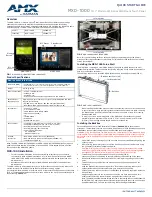
MTLC User Manual
32
May 22, 2014
Figure 4-12 Screen Shot of the Camera Demonstration
4
4
.
.
6
6
V
V
i
i
d
d
e
e
o
o
a
a
n
n
d
d
I
I
m
m
a
a
g
g
e
e
P
P
r
r
o
o
c
c
e
e
s
s
s
s
i
i
n
n
g
g
f
f
o
o
r
r
C
C
a
a
m
m
e
e
r
r
a
a
The Video and Image Processing (VIP) for Camera Example Design demonstrates dynamic scaling
and clipping of a standard definition video stream in RGB format and picture-in-picture mixing
with a background layer. The video stream is output in high resolution (800×480) on LCD touch
panel.
The example design demonstrates a framework for rapid development of video and image
processing systems using the parameterizable MegaCore® functions that are available in the Video
and Image Processing Suite. Available functions are listed in
. This demonstration needs
the Quartus II license file includes the VIP suite feature.
These functions allow you to fully integrate common video functions with video interfaces,
processors, and external memory controllers. The example design uses an Altera Cyclone® IV E
EP4CE115F29 featured on the VEEK-MT (MTLC+DE2-115).
A video source is input through the CMOS sensor on VEEK-MT which generates a digital output in
RGB format. A number of common video functions are performed on this input stream in the FPGA.
These functions include clipping, chroma resampling, motion adaptive deinterlacing, color space
conversion, picture-in-picture mixing, and polyphase scaling.
The input and output video interfaces on the VEEK-MT are configured and initialized by software
running on a Nios® II processor. Nios II software demonstrates how to control the clocked video
input, clocked video output, and mixer functions at run-time is also provided. The video system is
implemented using the SOPC Builder system level design tool. This abstracted design tool provides
an easy path to system integration of the video processing data path with a NTSC or PAL video
input, VGA output, Nios II processor for configuration and control. The Video and Image
Processing Suite MegaCore functions have common open Avalon-ST data interfaces and Avalon
Memory-Mapped (Avalon-MM) control interfaces to facilitate connection of a chain of video
functions and video system modeling. In addition, video data is transmitted between the Video and
Image Processing Suite functions using the Avalon-ST Video protocol, which facilitates building
Summary of Contents for MTLC
Page 1: ...1 ...






































